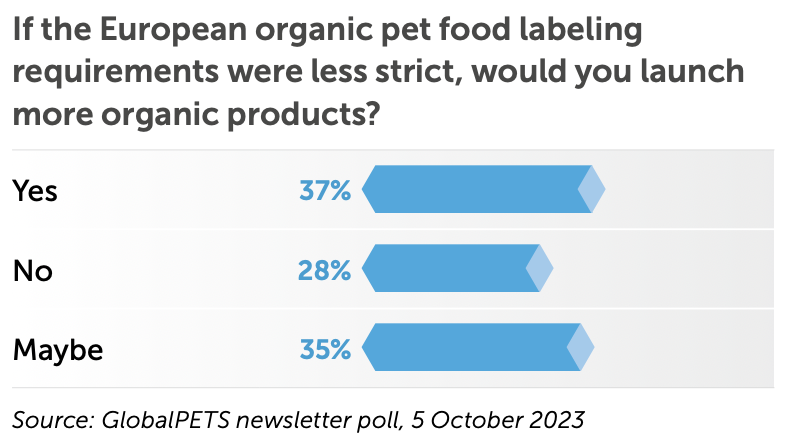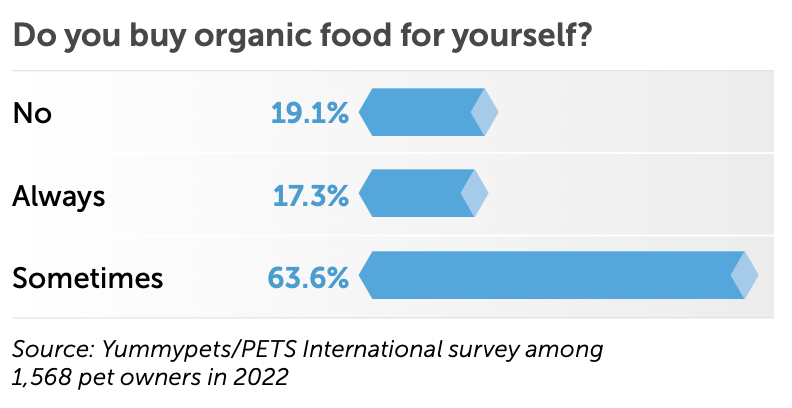Europe softens organic qualification criteria for pet food labeling

Now that the rule has been changed from 100% to 95% organic agricultural ingredients, will this accelerate the pet food industry’s contribution to a sustainable food value chain in the EU?
After a brief but intense outcry from the European pet industry, officials in Brussels have updated the legislation governing the labeling of organic pet food products. The Council of the European Union green- lit the change in early October. As a result, pet food and ingredients manufacturers will now be allowed to use the EU organic production logo if the formulation is made up of at least 95% agricultural ingredients of organic origin.
The new regulation removes the “excessively strict criteria” of 100% previously set by the European Commission in 2022. “This requirement was impossible for many pet food producers to satisfy, due to a lack of availability of appropriate organic ingredients,” admits the European Commission.
Hunting or fishing ingredients
The new legislation also includes a provision that pet food marketed in Europe with the main ingredient stemming from hunting or fishing will be allowed to be labeled as organic, as is the case with human food. “As long as all the other ingredients are organic and the denomination is clear, it will be possible,” clarifies German MEP Martin Häusling, who was appointed by the European Parliament as rapporteur for this bill.
The new rules are part of the EU’s Farm to Fork strategy, which aims to ensure a sustainable food value chain in the region.
Gray area
Until 2022, the labeling of organic pet food was regulated by national laws or, in the absence of those, by private standards recognized by the Member States. Those texts commonly contained the 95% requirement to qualify for organic labeling. However, the EU-wide Organic Production and Labelling Regulation, which entered into force in 2022 and replaced the previous national rules, established that only feed products made 100% from organic agricultural ingredients were allowed to be labeled as organic.
No exceptions were made for pet food. Since then, the industry has been operating in somewhat of a gray area. Some pet food products labeled as organic have been on the market for over a year, despite not being fully compliant due to not entirely being made from organic agricultural ingredients.
“We all hoped that this would be changed back to the old situation, but nothing was official,” says Rogier van Anholt, Project Leader Organic Legislation, Innovation & Sustainability at Yarrah Organic Petfood. Van Anholt recognizes that some ingredient players decided to wait during this period, and put any planned release of organic products in the European market on hold until the issue was resolved.
Over the past months, the pet industry has been intensively looking for possible alternative solutions in case the European Commission would not lower the limit. “We spend a lot of time finding organic fish, organic yeast… all the things that are agricultural and that need to be organic as well,” comments Van Anholt in a conversation with PETS International.
New market opportunities?
The European Commission believes that the updated regulation will make it easier for pet parents to identify organic ingredients in the pet food they buy, and will potentially increase the presence of such products in the market.
“Special labeling provisions should also be laid down to allow final consumers to identify the organic ingredients that are used in products which consist mainly of an ingredient that stems from hunting or fishing, provided that all other agricultural ingredients are organic,” states the legislative text.
The European Pet Food Industry Federation (FEDIAF) regards the new rules as a “significant step” for the pet food sector and stresses that organic pet food plays a “crucial role” in enhancing the by-products of the organic food chain. “Additionally, pre-packaged organic pet food will prominently display the organic production logo on the packaging, providing consumers with clear and reliable information,” it comments.
Final step
The new set of rules is now in force, as the text was published in The Official Journal of the European Union on 27 October. Manufacturers have until April 2024 to implement the EU organic production logo in their existing products that comply with the regulation.


